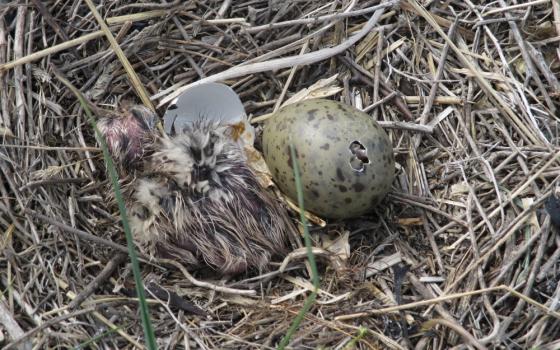A woman who has made a retreat at Tautra Mariakloster many times brought her Bible study group for a weekend retreat. She asked me talk to them about our monastic life. One question took me by surprise: How has my relationship with Jesus changed before and after I entered the monastery?
Before I entered I was intent on learning to be a Christian. I had professed Jesus as my lord and savior at 17 and had been baptized in the Pacific Ocean. What did it mean to follow Jesus? I was falling in love with him, and wanted to develop my prayer life. I came to see monastic life as the only way I could really give my life totally to him. So I entered the monastery thinking I was giving something to him, and ostensibly to get something for myself: a fruitful and life-giving prayer life.
In the monastery, I discovered that our call is something much bigger than being faithful to praying together seven times a day. The total package of community life, trying to live the Gospel, is something much more demanding. I found that it is really Jesus who gives everything to me. Monastic life, says Bror Cyrille, the old monk at nearby Munkeby, is about learning to receive. To receive the gift of each moment, even if it doesn't seem very evangelical or that it could possibly be God's will at the time. To learn to receive Jesus in my sister, and in every circumstance. I hope that as the puppy-love feeling faded, my love for Jesus matured, as in a marriage. Instead of thinking about the Beloved all the time, one's love and attention reach out to embrace a wider family.
It might be worth reflecting on our relationship with Jesus. How has it changed over the years, or even since yesterday? Who did I say that Jesus was when I entered? Who do I say that Jesus is now, for me?
One day recently, Sisters Rafael, Elia and I went swimming in the fjord, as is our wont when the water temperature climbs to 18 degrees Celcius (about 64 degrees F). We were careful not to step too close to the seagull nest near our boathouses. The nest was empty and we were afraid the chicks had been eaten. Then we saw the two, waddling awkwardly down the middle of the path, right where we go to enter the water. We made our way intently toward the water's edge, looking carefully at the path, and balancing rather precariously on the stones. When we reached the water's edge, we realized we no longer saw the chicks. Where had they gone?
After floating a few minutes in the shockingly refreshing water, we waded ashore, dried off and started walking back up the path. Suddenly Sister Elia saw that one of the speckled rocks on the side of the path, only 6 inches from us, was actually a gull chick, hunkered down and immobile so as not to attract attention. We marveled at the perfect camouflage. Then we saw that one of the speckled rocks on the other side of the path was actually the other chick. As soon as we looked away from the first chick, we could no longer see it. It blended perfectly in with the rocks on the shore.
Jesus says to Peter, "You are the rock." Did he mean that instead of sitting high on a throne, he should be like a seagull chick, blending in with all the other rocks? Like Pope Francis says, the shepherd should have the smell of the sheep. Be the beautiful harmony of the rocks on the shore, each contributing to the whole, and supporting the others.
Sister Rafael commented that the chick was actually quite vulnerable, its newly fluffed feathers making it seem larger than it really is. Only two days old, it cannot walk very fast, and it has not yet had flight or swimming lessons. It tumbles and stumbles over the stones to find a place of security. If the sea eagle flies over the exposed rocks at low tide, the chick has only its camouflage to protect it.
Maybe Jesus means even a rock is vulnerable, and should be so.
We are all rocks, living stones building up the church of Christ. Perhaps Jesus meant us to do so while accepting our vulnerability and receiving help from the others whose speckled personalities and rough edges are oh-so-irritating. Are we not all fledglings under the shadow of Jesus' wings?
Who do you say that Jesus is? Who does he say that you are?
[Sr. Sheryl Frances Chen was assistant editor of U.S. Catholic magazine before she entered the monastery to join the Order of Cistercians of the Strict Observance (OCSO). Now she is chantress and Saturday cook at Tautra Mariakloster on an island in the Trondheim fjord.]



